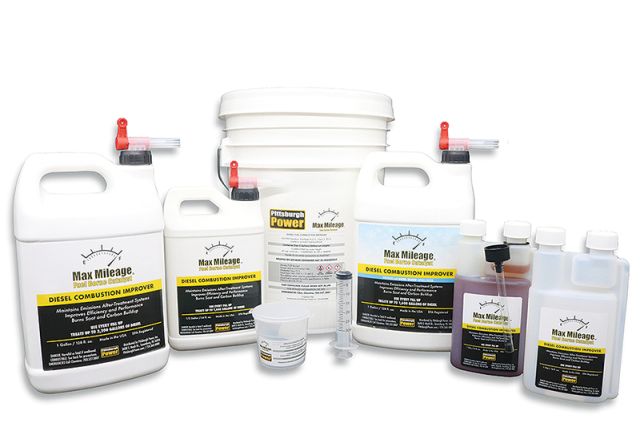What's Fuel Catalyst?

Max Mileage fuel-borne catalyst is a type of chemical additive that is added to diesel fuel to improve fuel efficiency and reduce emissions. The purpose of these catalysts is to improve combustion and reduce friction within the engine, resulting in increased fuel efficiency, lower emissions, improved engine performance, and a smoother running engine based on the testimonials of our satisfied customers.
Catalysts typically contain metal compounds, such as cerium or iron, which act as catalysts to help the fuel burn more efficiently. If you are a listener of The Power Hour with Kevin Rutherford (When it is aired on Letstruck.com every Tuesday, 11 Am EST), you will have heard discussions of elevated iron content in our oil analysis segments. Max Mileage FBC is the reason behind that elevated iron content nine times out of ten, and it is nothing to be concerned about; it will not harm your engine. When added to the diesel fuel, the catalysts are dispersed throughout the fuel and carried into the engine, interacting with the fuel and improving combustion.
Fuel catalysts are a relatively new technology that has proven extremely effective in modern diesel engines. In simple terms, fuel catalysts are added to diesel fuel to improve its combustion properties, making it burn more efficiently and effectively. Several critical benefits of fuel catalysts in modern diesel engines are outlined below.
1. Improved fuel efficiency: One of the most significant benefits of fuel catalysts is that they can improve fuel efficiency. By improving the combustion properties of diesel fuel, fuel catalysts allow engines to extract more energy from the fuel, leading to better fuel economy. This can translate into significant cost savings for fleet owners and operators and reduce carbon emissions.
2. Enhanced engine performance: Another key benefit of using fuel catalysts is enhanced engine performance. By optimizing the combustion process, fuel catalysts can increase engine power, torque, and responsiveness, leading to improved acceleration and overall performance.
3. Cleaner engine operation: Fuel catalysts also contribute to cleaner engine operation by reducing the number of harmful emissions produced during combustion. This includes reducing carbon monoxide, nitrogen oxides, and particulate matter, making diesel engines more environmentally friendly.
4. Increased engine lifespan: By improving fuel efficiency and reducing emissions, fuel catalysts can also increase the lifespan of diesel engines. This is because the reduced stress on the engine components and reduced deposits in the engine oil can minimize wear and tear, extending the life of the engine.
5. Easy to use: Fuel catalysts are also very easy to install and use, making them a convenient and cost-effective solution for diesel engine operators. They are typically added directly to the fuel tank and do not require any additional modifications to the engine.
It's important to note that not all fuel-borne catalysts are equally effective, and it's important to choose a product that has been tested and proven to be effective. On our website (Pittsburghpower.com), multiple resources can be found describing in detail our dyno test phases, the results of that those tests, customer testimonials, product reviews, detailed instructions on how to use our catalyst, as well as information about how to keep your DPFs clean with our partner company, DPF Alternatives. We are so confident in the results of our product that with the additional and superior cleaning technology of DPF Alternatives and the regular use of Max Mileage FBC, you can obtain a lifetime warranty on the cleaning of your Aftertreatment filters. Pittsburgh Power and its associates are more than happy to answer any questions you may have about our products. We will do our utmost to respond with professionalism and 100% honesty.
In conclusion, fuel catalysts offer a range of benefits for modern diesel engines, including improved fuel efficiency, enhanced engine performance, cleaner engine operation, increased engine lifespan, and ease of use. With these advantages, it is clear that fuel catalysts are an essential technology for diesel engine operators and fleet owners looking to reduce costs, improve performance, and reduce their environmental impact.
Written by: Jordan Greathouse, Pittsburgh Power, 3600 S. Noah Dr., Saxonburg, PA, 16056 Phone (724) 360-4080
